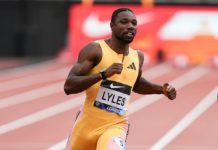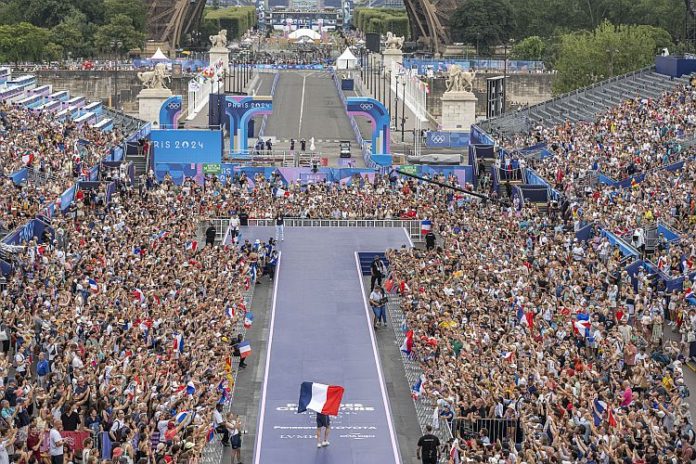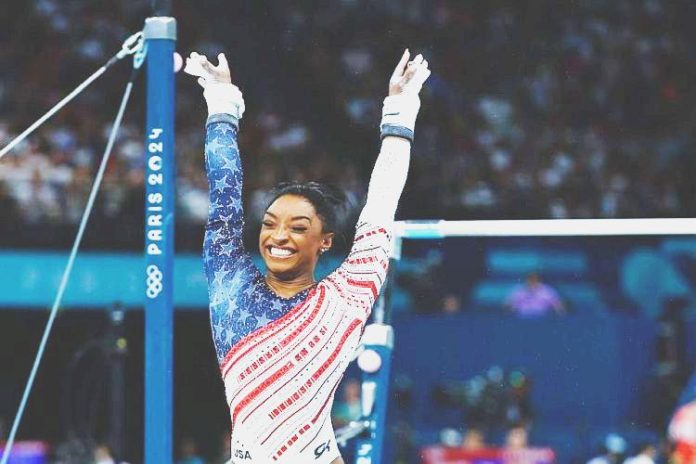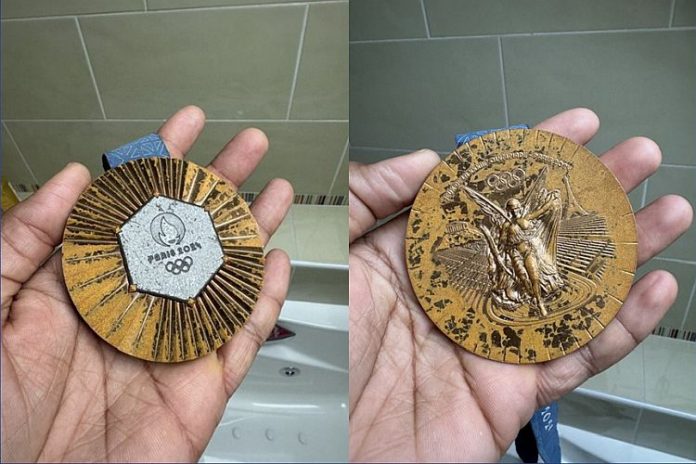★ The Sports Examiner: Chronicling the key competitive, economic and political forces shaping elite sport and the Olympic Movement.★
★ To get the daily Sports Examiner Recap by e-mail: sign up here! ★
≡ STORIES OF 2024 ≡
It was a grand year for Olympic sport in 2024, and after counting down the most compelling stories of the year from no. 10 to no. 6, let’s get to the top five!
No. 5: Records galore in swimming, in and out of the pool
It was a wild year in swimming, with amazing performances, starting with the U.S. Olympic Trials in June, held for the first time in an NFL stadium! USA Swimming held the Trials at Lucas Oil Stadium in Indianapolis, setting an indoor swim meet record with 20,689 in the house on 15 June and then 22,209 on the 19th.
In all, there were 285,202 ticketed attendees for the 17 sessions, an average of 16,777, to see a world record in the women’s 100 m Backstroke for Regan Smith and four wins by Katie Ledecky in the 200-400-800-1,500 m Freestyles.
On to Paris, where France’s Leon Marchand conquered everyone with gold-medal performances in the 200 and 400 m Medleys and a sensational, one-night double on 31 July in the 200 m Butterfly and 200 m Breaststroke, all four in Olympic Record times.
Four world records were set, including China’s Zhanle Pan with an other-worldly 46.40 in the men’s 100 m Freestyle, American Bobby Finke in the 1,500 m Free (14:30.67) and U.S. relay teams in the women’s 4×100 m Medley and Mixed 4×100 m Medley.
The U.S. led the medal table with 28 (8-13-7) and won one more gold than Australia (7), but was down vs. Tokyo 2020 (30: 11-10-9). USA Swimming chief executive Tim Hinchey’s contract was not renewed amid complaints from coaches about relations with the National Office, and the lack of a coach as the director of the national team program.
But the year wasn’t over and there were surprises to come at December’s World 25 m (short course) Championships in Budapest (HUN). There were many stars – like Marchand – who decided not to swim, but that did not stop a historic assault on the record books.
A stupendous total of 30 world short-course records were set, especially by American star Gretchen Walsh! Winner of two relay golds, a relay silver and the women’s 100 m Fly silver in Paris, she exploded in Budapest, winning seven golds, in the 50-100 Frees, 50-100 Flys, 100 m Medley and two relays and setting an unbelievable 11 world records along the way! She had never contested a short-course 100 m Fly before, but set world records in the heats, semis and final. She’s 21.
The U.S. also got world records from Luke Hobson, Kate Douglass and Regan Smith on the way to winning 39 total medals (18-13-8), with Canada second with 15 (4-5-6). Wow.
No. 4: Russia returns, in a small way
As the Russian war against Ukraine ground on in 2024, International Olympic Committee President Thomas Bach (GER) was determined to find an appropriate way to have some presence for Russian and Belarusian athletes at the Paris 2024 Olympic Games, holding that athletes who are “neutral” on the government’s war should have an opportunity to qualify and compete.
The IOC relaxed its 2022 protective ban on Russia and Belarus slightly, to allow individual “neutral” athletes to compete in Paris, but only after the IOC’s own review on neutrality vis-a-vis the war. Russian athletes qualified for 48 places, but the IOC review committee accepted only 30 and just 15 competed in Paris, winning one silver medal. Belarus earned 32 quota places and eventually sent 17, winning four medals (1-2-1).
Multiple federations relaxed their rules to allow Russian and Belarusian athletes to compete as “neutrals,” including cycling, gymnastics, judo, rowing and wrestling, with varying levels of scrutiny. However, the ban on Russian and Belarusian teams remained in place.
All of this outraged Ukraine and its supporters, who charged the IOC and others with allowing Russian to use these athletes to promote the government and its policies of aggression.
In a strange end to the year, Russian billionaire Alisher Usmanov was once again elected as the President of the International Fencing Federation (FIE), then announced he would step away from the office and retain the interim head of the federation to run things.
With the IOC set to elect a new President in 2025, the Russian government started a charm offensive, naming a former territorial governor, Mikhail Degtyarev, as Sports Minister and Degtyarev – with the approval of the Kremlin – also later elected as the President of the Russian Olympic Committee. He said Russia has to stop insulting the IOC and believes a full team will attend the Los Angeles Olympic Games in 2028.
No. 3: U.S. sensational in 2024; 12 world records set
It was a huge year for the United States in 2024, with a magnificent performance at the 2024 Olympic Games in Paris, but also for multiple performers who claimed a dozen world records across nine events:
● Men/3,000 m: 7:17.55, Jakob Ingebrigtsen (NOR)
● Men/Vault: 6.24 m (20-5 1/2), Mondo Duplantis (SWE)
● Men/Vault: 6.25 m (20-6), Duplantis
● Men/Vault: 6.26 m (20-6 1/2), Duplantis
● Men/Discus: 74.35 m (243-11), Mykolas Alekna (LTU)
● Women/1,500 m: 3:49.04, Faith Kipyegon (KEN)
● Women/2,000 m: 5:19.70, Jessica Hull (AUS)
● Women/10,000 m: 28:54.14, Beatrice Chebet (KEN)
● Women/400 m H: 50.65, Sydney McLaughlin-Levrone (USA)
● Women/400 m H: 50.37, McLaughlin-Levrone
● Women/High Jump: 2.10 m (6-10 3/4), Yaroslava Mahuchikh (UKR)
● Mixed/4×400 m: 3:07.41, United States
The Paris Games were the centerpiece of the year, with the American team winning a superb 34 medals, its best since Los Angeles in 1984 (40), with men’s golds from Noah Lyles (100), Quincy Hall (400), Cole Hocker (1,500), Grant Holloway (110mH), Rai Benjamin (400mH), the 4×400 m relay and Ryan Crouser in the shot. The women got wins from Gabby Thomas (200), Masai Russell (100mH), McLaughlin-Levrone, in both relays, the long jump (Tara Davis-Woodhall) and discus (Valarie Allman). Crouser won the shot for the third straight Olympic Games.
Kenya’s Kipyegon won her third straight women’s 1,500 m, teammate Chebet won both the 5,000 and 10,000 m and Dutch star Sifan Hassan tripled with a bronze in the 5,000 m and 10,000 m and then won the marathon! Belgium’s Nafi Thiam won the heptathlon for the third straight time.
World Athletics made headlines by becoming the first federation to offer Olympic prize money, paying $50,000 to each Paris winner. There was condemnation from most other federations – who don’t have that kind of money to spend – and from the IOC as well. World Athletics chief Sebastian Coe (GBR) – himself a two-time Olympic 1,500 m champion – said athletes should be rewarded, but admitted the announcement could have been handled more deftly.
Off the track, there was significant news with Atlanta 1996 icon Michael Johnson raising $30 million to start his Grand Slam Track circuit, with 96 contracted athletes racing for $12.6 million in prize money across four meets in 2025. The Athlos NYC meet in September had six all-women races and paid prizes of $60,000-25,000-10,000-8,000-5,000-2,500.
In November, World Athletics introduced its “Ultimate Championship” for 2026, a three-night show with 26 individual events, two relays and $10 million in prize money. It may be that 2024 will be the pivotal year for track & field athletes to be better paid and presented.
No. 2: IOC’s Bach declines to stay on
“So many of you have asked me to have my mandate extended and to agree with a change to the Olympic Charter for this purpose. …
“As a result of deep deliberations and extensive discussions, also with my family, present in the room, I have come to the conclusion that I should not have my mandate extended beyond the term limits enumerated by the Olympic Charter.”
That was IOC President Thomas Bach, now 70, at the 142nd IOC Session in Paris on 10 August, the day before the close of the Paris Olympic Games.
In a carefully-prepared speech, he pointed to the IOC’s strong position, with Olympic Games already awarded for 2028 and 2032 and Winter Games awarded for 2026-30-34, $13.5 billion in committed revenues through 2032, and a host of new initiatives. But he added:
“To implement effectively all these projects, to address the technological tsunami of converging sciences like A.I., biochemistry and neuroscience, you need to be immersed in this digital world. You need to participate in this digital world. You need to have a deep understanding of these new ways of thinking and communicating. Otherwise, you cannot safely navigate our Olympic Movement ship through the high waves of this tsunami.
“For this new way of living, I, with my age, I am not the best captain. New times are calling for new leaders. I know, with this decision, I am disappointing many of you. I can only plead to you to respect that I am deeply convinced this to be in the best interest of our beloved Olympic Movement.”
In response, the election of the next IOC President was set for March 2025, at the IOC Session in Greece, with seven candidates coming forward: Prince Feisal Al Hussein (JOR), World Athletics chief Coe, swimming gold medalist and Zimbabwe Youth Minister Kirsty Coventry, FIS chief Johan Eliasch (GBR), UCI President David Lappartient (FRA), Juan Antonio Samaranch (ESP), and gymnastics head Morinari Watanabe (JPN). And the campaigning has started in earnest.
Bach has his detractors, but he will be remembered as a transformative IOC President, who turned the organization around from disarray to a new high in prestige, power over sport and financial security.
No. 1: A fabulous, wonderful Olympic Games in Paris
In the aftermath of the Covid-impacted Tokyo 2020 Olympic Games, held in 2021, the Olympic Movement needed a powerfully-produced, high-impact Olympic Games in Paris in 2024. Desperately.
And Paris delivered. Did it ever.
Placing the competitions against a backdrop of iconic Parisian location, topped by the Eiffel Tower, the Games of the XXXIII Olympiad proceeded with brilliance, glory and a rapt audience that filled the stands and glued viewers to television sets, computers, tablets and phones for 17 days in July and August.
There was plenty of controversy prior to the Games – as always – with severe doubts and warnings about budgets, the radical opening on the Seine River, security, air conditioning in the Olympic Village, too much emphasis on sustainability and so on. In the end, Paris was the winner:
● The Seine opening went off without security issues, although the ceremony programming itself was criticized over some of the content. And despite some delays, the open-water swimming and triathlon events were held in the Seine as well.
● The Games were visually brilliant and although there were issues, they were mostly behind the scenes and workarounds were found. The athletes got to the venues on time and the competitions were spectacular.
● While the U.S. led the medal table at 126 – its best performance ever outside of a U.S.-hosted Games – the French heroes delivered, starting with swimmer Leon Marchand and his four gold medals, all in Olympic Record times. And there was judo star Teddy Riner, who won his third gold in the men’s +100 kg class and clinched the Mixed Team gold with a final victory for the French team. French athletes won 64 total medals (16-26-22), up from 33 in Tokyo and the most since the 1900 Olympics, also held in Paris!
● Fans had more opportunities to experience the Games than ever before, with the new Champions Park program to salute medal winners, the Nations Park with the hospitality houses of 15 National Olympic Committees, and the first-ever Marathon Pour Tous, with nearly 34,000 runners taking part in the 10k or marathon, on the Olympic route.
And despite all of the fears, the Paris Games were contained within expected costs:
● The government’s Solideo construction subsidiary completed the work on a new arena, the Olympic Village and other projects on time and within its €3.2 billion budget. (€1 = $1.04 U.S.).
● The Paris 2024 organizing committee reported it finished with a surplus of at least €26.8 million, on revenues of €4.481 billion and expenses of €4.454 billion, including 70 sponsors and suppliers.
● The surplus was primarily the result of the fabulous ticket sales, with an all-time record of 9.55 million Olympic tickets sold and 2.57 million Paralympic tickets, for a total of 12.12 million.
Paris 2024 had 41,000 volunteers helping with the Olympic and Paralympic Games, universally adored for their positive attitude and willingness to help.
It was a wonderful Games, with a worldwide audience approaching five billion, and restored the luster of the Olympic Games as an unmatched, worldwide celebration of sport. For those who still doubt the power of the Games, those who experienced the 2024 edition will say, “We’ll always have Paris.”
Coming next: the stories to look for in 2025!
Rich Perelman
Editor
★ Receive our exclusive, weekday TSX Recap by e-mail by clicking here.
★ Sign up a friend to receive the TSX Recap by clicking here.
★ Please consider a donation here to keep this site going.
For our updated, 885-event International Sports Calendar for the rest of 2024, 2025 and beyond, by date and by sport, click here!




























